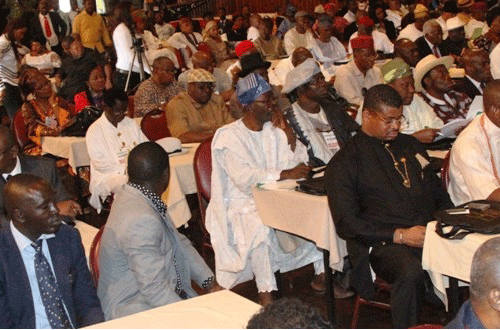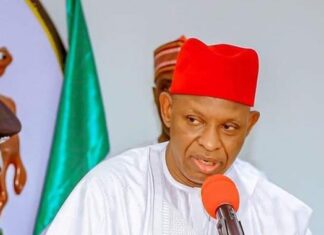Robust arguments, for and against, were witnessed on Wednesday as the National Conference, in plenary session, began debate on reports submitted by the 20 Committees that deliberated on critical national issues.
Opening the flood gate of opinions of the 492 delegates was the Report of the Committee on Citizenship, Immigration and Related Matters, headed by Dr Muhammad Zaiyanu Abdullahi, the Emir of Yauri; and Chief Chidinma Uwajumogu who served as deputy chairman.
The report covered such areas as census; integrated national database; citizenship and nationality; residency and indigeneity; dual citizenship; movement of persons, goods and services; immigration and internal security; border control; refugee and asylum; and internally displaced persons.
These thematic areas were handled under three sub-committees whose separate reports were earlier debated at the committee level before they were collated into what was submitted to the Conference in plenary.
Dr Abdullahi informed the Conference that despite the existence of constitutional and legal framework for census and national identity management, the continued absence of accurate census figure and integrated national database has constituted a major challenge for national planning and security in Nigeria.
He said this has resulted in the failure to have an effective citizens’ identification system, which has negatively impacted on crime fighting and prevention.
He said as the population of Nigeria increases “without adequate knowledge of how many we are, and as the resources available to the people per head shrink, Nigerians clash with one another over resource allocation and identity issues.”
The committee chairman noted that the situation was bound to continue “for as long as Nigeria does not have the citizenship format, census figures and clearer constitutional provisions for allocating national resources.
“Political gerrymandering, militant groups and subversive ideas from the outside the country have continued to radicalize the identity question to the extent that several thousands of innocent citizens are killed across the land; displaced persons from these conflicts and other negative occurrences often lack adequate protection.
The report stated that non-implementation of the existing framework has often led to politicization of national census programme with past figures inflated for the purposes of increased revenue allocation and other advantages from the government at the centre.
In its recommendations which attracted a lot of praises and debate, the committee said the national census exercise should be preceded by the development of a full scale integrated national database.
The database is expected to include registration of all settlements; registration of all households; update and sustenance of birth and death registrations; and registered information or data of citizens and immigrants in Nigeria.
It recommended enactment of law by the National Assembly to criminalise any attempt by census officials or members of the public to inflate or distort in anyway, the outcome census exercise.
An aspect of the recommendations called for proper funding of the National Population Commission; the National Identity Management Commission; and the National Bureau of Statistics; with state of the art equipment so that they can achieve accurate census figures and integrated database for the country.
It yearns for a provision of National Identification Number and a multi-purpose digital card with biometric information for all citizens of 18 years and above.
According to the committee, this would serve as a social security number and card for the provision of welfare services to all citizens while the national identification card will similarly serve as voters’ card.
On the contentious issue of indigenship and settler dichotomy, the committee affirmed that “the right of any Nigerian citizen to be resident or domiciled in any part of Nigeria should be recognized. Such a resident shall enjoy all rights, privileges and facilities in the place of his or her choice, provided that such a person meets his or her basic obligations.”
The Committee urged the Federal Government to strengthen its border surveillance in a manner that prevents unlawful entry of persons, good and services into Nigeria.
It asked the Federal Government to take full advantage of the ECOWAS Protocol on Free Movement of Persons in a manner that would enhance national economic growth and also address inherent threats to national security by criminal and illegal immigrants.
On immigration and internal security, the committee expressed the need for government to adopt a regional approach to the management of Nigerian borders.
It said Nigeria should establish cooperation with neighboring states on the movement of persons; and that as is the practice in other parts of the world, intelligence should be exchanged across orders.
On another note, the committee said the Public Key Directory (PKD) infrastructure should be installed to enable countries to authenticate passports presented at points of entry and ensure that people with criminal records are not allowed into the country.
In his contribution to the debate, Professor Nsongurua Udombana urged committees to divide their reports into three parts for easy assimilation by the Conference and the Executive when the final Conference report would be presented.
He said there should a section for issues that are meant to serve as amendment to existing constitution; another section for issues that could be legislated upon by both the National and State Houses of Assembly; and others could be categorized as mere policy issues.
It was his view that when an issue is meant for amendment of the constitution, it should be drafted in the form of a constitutional clause for easy understanding.
The suggestion by Femi Falana that committee recommendations should not contradict the 1999 Constitution and the African Charter was opposed to by several delegates who said the essence of the Conference was for a possible amendment of the existing constitution or writing of a new one.
The day’s proceeding was however preceded by a Point of Information raised by Gen Jonathan Temlong from Plateau State who informed the Conference of the bloodshed in Jos following bomb explosions in a market on Tuesday.
While asking for a minute silence for the deceased, Temlong called for more proactive measures by security agencies so that what happened in Jos would not happen again.













